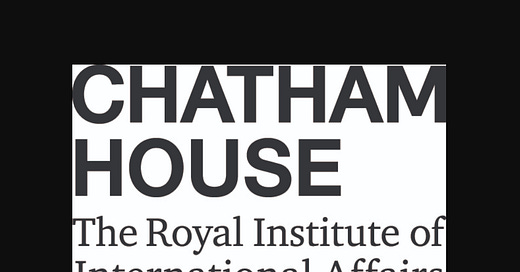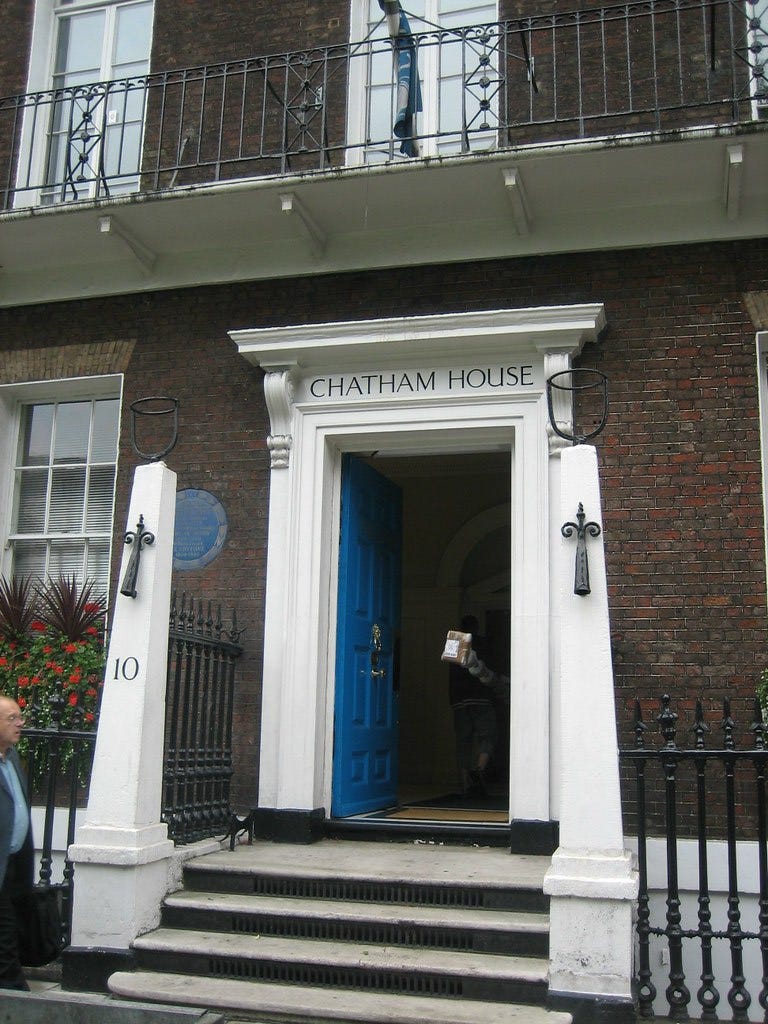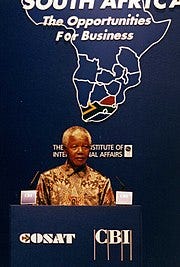THE ROYAL INSTITUTE OF INTERNATIONAL AFFAIRS (RIIA)
Residing at Chatham House, St James Square, London.
The Royal Institute of International Affairs, also known as Chatham House, is one of the world's leading institutes for the analysis of international issues. Founded in 1920, the Institute works to stimulate debate and research on political, business, security and other key issues in the international arena. It does this through its research, meetings, conferences and publications as well as through its library and information centre and expert interviews for the media.
The Chatham House Rule, used worldwide to allow for free speech and confidentiality at meetings, originated here. Under the Rule, anyone who comes to a meeting is free to use information from the discussion, but is not allowed to reveal who made any particular comment.
The Institute has a presence in the USA, where the Chatham House Foundation exists to promote support for Anglo-American ‘special’ relations, and to make the Institute accessible to an American audience.
At the outbreak of the WW2 the institute, under the Chairmanship of Waldorf Astor, was decentralised for security reasons, with many of the staff moving to Balliol College, Oxford. There, the Foreign Press and Research Service of the Institute worked closely with the British Foreign Office who requested various reports on foreign press, historical and political background of the enemy and various other topics supervised by Arnold Toynbee, dedicating their research to the war effort.
The institute also provided services to scholars and the armed forces at its St. James's Square home. Research facilities were opened to refugee and allied academics, whilst arrangements were made for both the National Institute of Economic and Social Research and the Polish Research Centre to relocate to the Institute following the bombing of their premises. In addition, allied officers undertook courses in international affairs at the Institute in an attempt to develop their international and political awareness as well as post war reconstruction planning.
But is Chatham House as innocent and patriotic as it seems?
During its early years, RIIA was principally funded by the Rothschilds through donations funnelled through Sir Abe Bailey and Sir Alfred Beit, with about £100,000 per year; since then, it has been funded with many millions of dollars by the Rockefeller Foundation and the Carnegie Corporation. ~ https://modernhistoryproject.org/mhp?Article=WorldOrder&C=1.2#Order
The post-war years
Chatham House had been researching potential post-war issues as early as 1939 through the Committee on Reconstruction. Whilst a number of staff returned to the Institute at the end of the war, a proportion of members found themselves joining a range of international organisations, including the United Nations and the International Monetary Fund. Combining this with the institute's early support of the League of Nations and impact of the gold study on the Bretton Woods system, Chatham House found itself to be a leading actor in international political and economic redevelopment.
In reaction to the changing post-war world, Chatham House embarked on a number of studies relating to Britain and the Commonwealth's new political stature, in light of growing calls for decolonisation and the development of the Cold War. A board of studies in race relations was created in 1953, allowing for the close examination of changing attitudes and calls for racial equality throughout the world. The group broke off into an independent charity in 1958, forming the Institute of Race Relations.
Following the Cuban Missile Crisis and Brazilian coup d'état, the institute developed a growing focus on the Latin American region. Che Guevara, then Cuba's Minister of Industry, wrote an analysis of ‘The Cuban Economy: Its Past and Present Importance’ in 1964 for the 100 year old London Journal, International Affairs.
Chatham House played a more direct role in the international affairs of the Cold War through the October 1975 Anglo-Soviet round-table, the first in a series of meetings between Chatham House and the Institute of World Economy and International Relations in Moscow. As an early example of two-track diplomacy, the meeting sought to develop closer communication and improved relations between Britain and the Soviet Union.
Soon after the first Anglo-Soviet round-table, the Institute began an intensive research project into ‘British Foreign Policy to 1985’. Its primary aim was to analyse the foreign policy issues which Britain would encounter in the near and far future. Research began in 1976 and the findings were published in International Affairs between 1977 and 1979.
At the start of the 1980s, the Council moved to expand the institute's research capabilities in two key emerging areas. The first modern programmes to be created under this initiative were the Energy and Research Programme and the International Economics Programme, formed in 1980 - 1981.
In addition to reshaping its research practices, the institute also sought to strengthen its international network, notably amongst economically prosperous nations. For example, Chatham House's Far East programme, created with the intention of improving Anglo-Japanese relations in the long and short term, was bolstered by the support of the Japan 2000 group in 1984.
Recent history
The Institute celebrated its 75th anniversary in 1995, an event marked by the visit of Queen Elizabeth II and Prince Philip, Duke of Edinburgh. During her visit, the Queen was briefed by the institute's experts on South Africa in preparation for her impending visit to the country, following the end of apartheid.
Nelson Mandela delivering a speech at the Chatham House conference 'South Africa: The Opportunities for Business', 10 July 1996.
In 1998, the Angola Forum was created. Its oil reserves, combined with growing international ambition, facilitated Angola's quick ascent as an influential African nation, resulting in Chatham House launching the Forum to create an international platform for "forward looking, policy focused and influential debate and research".
In 2005, Security, Terrorism and the UK was published.
The Chatham House Prize was launched in 2005, recognising heads of state and organisations that made a significant contribution to international relations during the previous year. Queen Elizabeth II presented the debut award to Ukrainian President Victor Yushchenko.
In January 2013, the Institute announced its Academy for Leadership in International Affairs, offering potential and established world leaders a 12-month fellowship at the institution with the aim of providing "a unique programme of activities and training to develop a new generation of leaders in international affairs."
In November 2014, The Queen formally launched the academy under the title of the "Queen Elizabeth II Academy for Leadership in International Affairs."
The Institute celebrated its centenary in 2020 with a series of special events and new initiatives such as the SNF CoLab, the Common Futures Conversations project, and the introduction of a panel of young advisers, plus three special Chatham House Centenary Awards for Sir David Attenborough, Melina Abdullah and Greta Thunberg.
In April 2022, Russia designated Chatham House as an undesirable organisation amid its ongoing crackdown on international and domestic NGOs, media, and democratic institutions. In its April 8 statement, the Russian Prosecutor-General's Office gave a standard explanation for the move, saying that the organisation’s activities pose “a threat to the Russian Federation's constitutional order and security."
The move was initiated by a commission of the Russian parliament‘s lower chamber, the State Duma, which asked the Prosecutor-General’s Office to add 14 international NGOs of Poland, Germany, and Britain, including Chatham House, to the list of undesirable organisations.
2017 reports included The Struggle for Ukraine, an exploration of how, four years after its Euromaidan revolution, of Ukraine's fight for survival as an independent and viable state; and Chokepoints and Vulnerabilities in Global Food Trade advocates for policymakers to take immediate action to mitigate the risk of severe disruption at certain ports, maritime straits, and inland transport routes, which could have devastating knock-on effects for global food security; Collective Action on Corruption in Nigeria: A Social Norms Approach to Connecting Society and Institutions examines how anti-corruption efforts could be made significantly more effective through new ways of understanding why people engage in the practice; and America’s International Role Under Donald Trump explores the impact of President Donald Trump’s personality and style—brash, unpredictable, contradictory and thin-skinned—on his engagement in foreign affairs.
Major reports in 2018 included Transatlantic Relations: Converging or Diverging? which argues that the longer-term fundamentals of the transatlantic relationship remain strong, as well as Making Concrete Change: Innovation in Low-carbon Cement and Concrete exploring why significant changes in how cement and concrete are produced and used are urgently needed to achieve deep cuts in emissions in line with the COP21 Paris Agreement on climate change, and Artificial Intelligence and International Affairs arguing the rise of AI must be better managed in the near term in order to mitigate longer term risks and to ensure that AI does not reinforce existing inequalities.
2019 saw three major reports produced. The UK and Japan makes the case that a stronger relationship could advance each country's ability to address shared global concerns. Conflict Economies in the Middle East and North Africa examines the common economic factors that continue to drive conflict in Iraq, Libya, Syria and Yemen. And Kazakhstan: Tested by Transition examines if the country can pursue modernisation and reform, and break from its authoritarian past.
In 2020 and 2021, there were reports on The Business Case for Investment in Nutrition claiming to be the first of its kind to reveal the hidden costs of malnutrition for business, and the extent to which these costs are recognised and addressed by multinational companies and Myths and misconceptions in the debate on Russia which aims to deconstruct the most prevalent myths and misconceptions that shape contemporary Western thinking on Russia.
From the above information we can see that the RIIA keeps ahead of the world, either predicting or actively leading geo-political agendas.
The think tank we know as Chatham House has far more impact than its simple facade might convey!
So follow the money?
During the 2020/2021 year, Chatham's largest donors were listed as:
The MAVA Foundation which provided over ₤5,000,000. MAVA was founded by Luc Hoffmann, a Swiss ornithologist, conservationist, and philanthropist. He also co-founded the World Wildlife Fund (WWF).
The UK Foreign, Commonwealth and Development Office, which provided over ₤1,000,000.
The charitable organisation Robert Bosch Stiftung provided between ₤500,000 and ₤1,000,000.
The Japanese Ministry of Foreign Affairs provided between ₤500,000 and ₤1,000,000.







Spot on. I said before and I say it again. My main concern for you and other brave people who voice their opinions here, and anywhere, remains that you are all SAFE. In not so distant past, many have "disappeared" or got sick with "mysterious" illnesses particularly in Easter Europe (uncorrupted scientists, doctors, virologists and ordinary people). People who knew what was going on in biolabs in Ukraine. Their voices never got heard internationally, their warnings ghosted. And they remain nameless to this very day. I continue to pray for your safety and I hope you remain firmly settled in your belief that they have no right nor power to silence you. Knowing you feel and think the way that you do gives me hope. Maybe something can be done. Maybe it is not too late. Maybe somebody can do something about it, where so many before them have failed. God Bless You Frances Leader!
More Orwellian speak: Philanthropy.
A friend recently said that conspiracy theories were wrong to criticise Bill Gates, because Gates said that he was "giving all his money away".